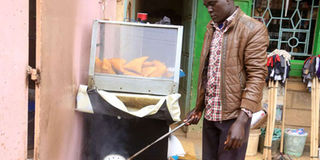Struggle of small traders eking out living in the city

Handson Oroko, 22, from Sunton, Kasarani, is a small trader in Nairobi. He sells mandazis. PHOTO | JEFF ANGOTE | NATION MEDIA GROP
What you need to know:
- Low income families, which cannot afford to pay more for the commodities, are often forced to skip some meals to survive.
On the receiving end are the small-scale vendors of various items, including food.
Thousands of people eke out a living from small-scale trading in the city.
Earning an average of Sh1,000 a day, traders have to struggle to live off their ventures
When the cost of sugar, flour, cooking oil and other basic commodities rises, the increase throws budgets of most households into a spin. Low income families, which cannot afford to pay more for the commodities, are often forced to skip some meals to survive.
On the receiving end are the small-scale vendors of various items, including food. Thousands of people eke out a living from small-scale trading in the city.
Handson Oroko, 22, from Sunton, Kasarani, is one of them, and he lives off selling mandazis.
HOUSEHOLD EXPENSES
Oroko told the Saturday Nation that life in the city has become a real struggle.
“I spend Sh1,800 every morning to buy flour, oil, sugar, charcoal and packing bags. I use between eight and 10 packets of flour per day,” said Osoro.
His profit margin ranges from Sh1,200 to Sh1,400 a day. Weekends are the busiest for him.
“I am make up to Sh2,000 in profits on a good day during the weekends. This sounds like good money but it can hardly cater for all my needs,” he says, capturing the plight of thousands of small traders in the city.
His monthly rent is Sh4,000 while his daily household expenses gobble up Sh400.
PAYING FARE
There are other unforeseen expenses like sickness that also eat into the money.
“Working within the neighbourhood cushions me against paying bus fare. It would have been so difficult for me if I had to commute daily,” he said.
He does not have a family yet, however, he fends not just for himself but also for his younger brother who lives with him.
“When our father passed on in 2015, I could not proceed to secondary school. I came to the city to look for a job. I first worked at a restaurant where the pay was so little for sustenance. I then decided to start my own business which I have done for over a year now,” he says.
SCHOOL FEES
It is also his responsibility to help their mother and younger siblings who live in Kisii.
“Out of my daily earnings, I must send them Sh500 back home for their support at least once every week. Sometimes it is more. When they are sent home for school fees, it is my responsibility to send them back to school,” he says.
And despite this, he saves Sh400 per day and works the entire week without taking a break to live “comfortably”.
“The biggest threat to my business is bad debt. I buy new stock every day from money I made the previous day. So if a customer takes goods and fails to pay on time, I am unable to buy. This in turn affects my daily earnings,” he recounts.
MANY OUTLETS
“It is hard to deny diligent customers credit because most of them are people who live in the neighbourhood. Some however disappear with the money,” he says.
He notes that selling food is one of the most profitable businesses in the city. People will eat irrespective of the season.
“But with so many outlets, it has been difficult for me to save a substantial amount of money to undertake any meaningful project. I had hoped to rent out an indoor space at the beginning of the year so that I could expand my business. But I could meet the target of Sh70,000 that I had set for myself.”
VARIETY OF FOODS
My dream is to start a food kiosk and to sell a variety of foods.
With so many people in this neighbourhood, such a business is likely to do well.
I would love to have fun like men of my age, but my earnings do not allow me.





